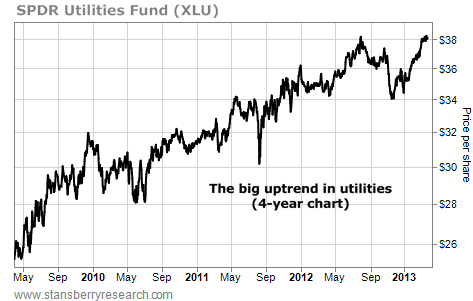| Home | About Us | Resources | Archive | Free Reports | Market Window |
A Much Better Inflation Hedge Than Gold StocksBy
Wednesday, March 27, 2013
When it comes to managing inflation, most analysts (including some of mine) will tell you to buy gold stocks and other companies that own hard assets.
And yes, it's true... those can be good stocks to own during periods of massive currency volatility. If you pick the right mining stock, you could do well over the next several years.
On the other hand, the greatest investor of the last inflationary cycle – Warren Buffett – has never bought a gold stock.
Instead, he has focused on an entirely different group of stocks...
Buffett figured out, long before anyone else I can name, that the best way to profit from inflation wasn't by buying hard assets or the companies that produce them... Instead, you should buy companies that don't require any additional capital at all (or require very little).
Buffett figured out that companies that don't require much in ongoing capital investments can simply raise their prices to combat inflation. Then, they can pay out the excess returns to shareholders. The result? Higher dividends every year.
Buffett says these companies have "economic goodwill." I call them "capital efficient." But it's the same idea.
Most of the extremely valuable, highly capital-efficient businesses produce simple, branded consumer products that are known for consistent quality and consumer loyalty... such as Heinz ketchup... Coca-Cola's soft drinks... McDonald's hamburgers... and Hershey chocolate.
I recommended Hershey (NYSE: HSY) to my Investment Advisory subscribers back in 2007. At the time, I told readers it would likely be the most profitable stock recommendation I'll make in my life. (To date, my subscribers have made nearly 130%.)
From 2005 to 2012, Hershey repurchased more than $1 billion worth of its own stock – more than 10% of the company, in addition to paying large ($200 million-plus) cash dividends.
Hershey can afford to return so much capital to its shareholders because it requires little capital to grow. In 1997, the firm invested $172 million in property and equipment. By the end of 2012, its annual capital budget had only increased to $259 million – essentially unchanged. Meanwhile, cash profits had reached $836 million – growth of more than 150%.
This is the beauty of a capital-efficient business: While sales and profits grow, capital investments don't.
Hershey doesn't have to invent chocolate year after year. It doesn't have to build new plants. Because it has the love of its customers, it doesn't even have to spend that much on advertising. Over time, it can spend less and less on advertising because its installed user base grows and grows.
That's what makes Hershey a very capital-efficient business.
And a business like Hershey tends to do very well during inflationary periods... even better than gold stocks.
I've studied the long-term returns in Hershey stock. I've studied the returns of gold and gold stocks. And since 1980, the price of an ounce of Hershey chocolate has risen roughly as much as the price of an ounce of gold.
But here's the best thing... Hershey doesn't have to mine chocolate. It doesn't have to spend money buying up equipment and new holes in the ground, which is enormously expensive. And it doesn't have to deplete its balance sheet to make money.
Every time a gold company sells a bar of gold, it loses something from its balance sheet. Every time Hershey sells a chocolate bar, it loses nothing from its balance sheet.
Think about this for a minute. A gold mine is a depleting asset. To make money, it must slowly sell off parts of itself. A chocolate factory is not. To make money, it must simply produce the product its customers are accustomed to. Some routine maintenance is necessary, but that's about it.
In sum, if you want to protect yourself from inflation... and if you want to become truly wealthy through investing... your best, safest choice is to buy these kinds of companies – the Hersheys, the Coca-Colas, and the McDonald's.
These businesses will be able to raise their prices along with inflation... while having to spend comparatively little on growing and maintaining their business. That is exactly why Buffett focuses on these companies... and it's exactly why I've been telling my readers to buy them.
Regards,
Porter Stansberry
Further Reading:
Legendary investor Warren Buffett made his fortune buying capital-efficient businesses. Porter calls it the only sure way to get rich in stocks. "I'm sorry it's boring... but it works," he writes. Read more here: The Best Investment Advice You'll Never Take.
Before you get started investing in these companies, you'll want to understand how to measure capital efficiency and learn the two dangerous pitfalls to avoid.
Market NotesAN UPTREND IN ONE OF THE LAST SAFE, HIGH-YIELD SECTORS The market is voting for Dr. Steve Sjuggerud's recommendation to buy utility stocks.
Back in November 2011, Steve told readers to consider buying the safe and steady businesses that provide water, electricity, and gas to people's homes. Utilities are recession-resistant businesses... and they're famous for paying dividends.
That's part of what drew Steve to the sector. The "spread" between Treasury yields and utility dividend yields had reached a rare extreme... Utilities were paying a relatively higher yield than they had at any time in the previous 50 years.
In today's near-zero-percent world, the safe 4% paid out by the big utility stock fund (NYSE: XLU) is unusually rich. It's hard to find another group of stocks treating shareholders as well. And today's chart shows investors are catching on. XLU just broke out to a new four-year high.
– Sam Latter
 |
Recent Articles
In The Daily Crux
|


